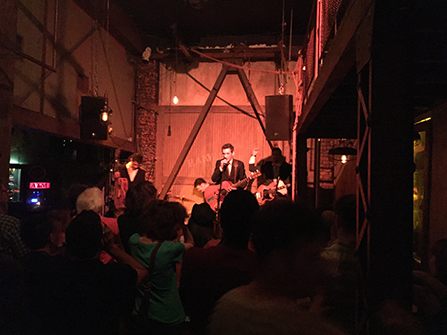Interview - John Hawkes’s interview about his work on Too Late and his career
By Mulder, Los Angeles, 10 december 2016
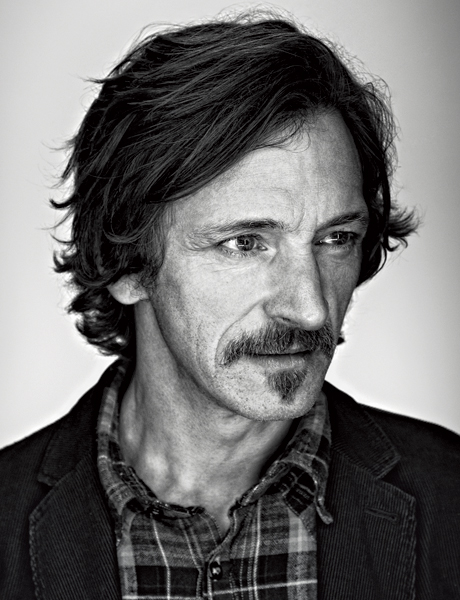
Q: In you past career you have worked with John Flynn, for "Nails", Frank Marshall, "Congo", Robert Rodriguez, for "From Dusk til Dawn", Brett Ratner, "Rush Hour", Michael Mann, Ridley Scott, Wolfgang Petersen, Steven Soderbergh, Steven Spielberg. How do you choose the films in which you work?
John Hawkes: Well, early on in my career I did not have a lot of choice. I needed to pay rent so I often took any job that came along. Later on, once I had choices, my decisions became simple. I look for a really great story, with really great people associated, storytellers if you will. Director, writer, producers, actors, and then also a really great role. It is a combination of the people, the part and the project.
Q: How did you come to work on the film "Too Late," and can you talk about your collaboration with Dennis Hauck on the film?
John Hawkes: Sure. "Too Late" is a very ambitious project. A relatively low budget film, shot in 35 mm in five long takes. Regarding collaboration with Dennis, he always made himself very available to speak to about the script, the character, the scenes we were working on, and because the film shot over several years, just by its nature, the collaboration understandably got easier. We took a lot of time before shooting, we had informal meetings, sometimes over a glass of whiskey, talking about the scene we were going to shoot.
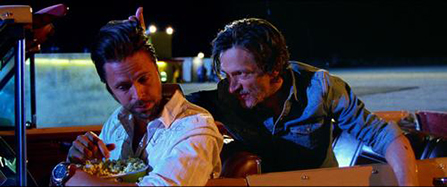
Q: Where did you find your inspiration for the song?
John Hawkes: To begin with, the script called for it. It is not something I had asked to do when I read the script. There was a moment in the screenplay that described it thus: Samson starts strumming and sings them a song about a girl named Mary, and the good times they once had. That was the start of my inspiration. Then, what I began to do so I could write the song, was to imagine we had not shot the scene. I read the script every day. In this particular scene, to put it simply, I thought what will serve the story best? The scene is at the end of a long take, and it is a very late night in a bar. That is how I began. I felt that the song could be relatively simple, it did not need to be long. It should offer a subtle clue around the story's mystery, but have an elusive quality. It should ask questions, rather than answer them. I also felt like the song could be plaintive and bittersweet, and have a “late night” feel. I wanted all those things in the song, so I had to write something for that. It definitely took some work.
Q: What is your process for coming up with lyrics?
John Hawkes: It is different every time. Sometimes a piece of music inspires you to write lyrics for the piece of music you come up with. Just lyrics themselves, it is such a mysterious process. Sometimes they seem to fall from the sky into a hole in the top of your head. Others, you chase through bus stations and city streets. Lyrics can follow you around in your car, in the shower, almost like a stalker. Sometimes I have written songs on bar napkins in five minutes without scratching off a word, and other times, a song has taken five years. When it takes that long, the song seems to follow you around, until finally it has got you in a corner, and you have to submit to it. You have been thinking about it so long at that point that you can almost write it out for the first time straight through.

Q: Dennis Hauck is the writer and director of "Too Late". Did you know Dennis prior to reading the script, and how did you come across the script itself?
John Hawkes: I did not know Dennis. We have a common friend named David Yow, who was part of the Austin, Texas music scene that I was a part of, and gained some fame for his band Jesus Lizard. Dennis found him because he was a fan of that band, and eventually met him and approached him to be in a short film Dennis had done. When "Too Late" came around, David suggested that I would be good for the role, and actually said he wrote the role for me, but didn't know how to get it to me. So he went through David Yow. That is how I got the script. It took a long time to agree to do the film. I liked the idea of it. Dennis made minor rewrites after about a year of looking at the script, and I thought it was in good shape and I came onto the project.
Q: There are five scenes in this movie that are twenty minute takes. What is the biggest creative challenge of working with such long takes?
John Hawkes: I think that since there are no edits at all, the challenge is that so many things had to go right, beyond what the actors are doing. The camera and crew are also doing an almost choreographed dance to capture the twenty minute scene. I think the biggest creative challenge is mistakes. You are never going to get a perfect twenty minute take, so you often end up picking the one that has the most soul. That is the challenge. There is no editing. In a twenty minute take, there is so much going on, and you are trying to do your part. All of us are trying to get it right.
Q: On average, how many takes did you have to do for each twenty minute unedited scene?
John Hawkes: Well, normally the process was like this: We would meet the actors who were going to be in that particular scene, and the director Dennis Hauck would meet the actors for about an hour and a half, and maybe read the scene a couple of times to talk about it. The next day generally, we would go to the location and work on the scene while the camera and crew began to choreograph the movement of the camera. At the end of that long day on location, we usually got one 35 mm take, and then the next day we would come in and do as many as we could. I think Dennis would know better about the average of takes it took. The least that we ever got was maybe nine or ten, and the most we ever got was probably twelve or thirteen.
Q: Can you talk a little about your music background, and what you like to listen to most as a musician and singer?
John Hawkes: Sure. I grew up in a rural, remote part of the United States, in northern Minnesota. We had one channel on TV when I was growing up, so I read a lot of books and listened to a lot of music. I've always been stirred and moved by music. I have no formal training as a musician or an actor. I just picked up a guitar and started to play it because my older brother did and I wanted to be like him. Eventually I ended up in Austin, Texas and in the post-punk scene of the early 80s a lot of people began to be in bands because they realized that you did not necessarily have to be the Rolling Stones or The Eagles to connect with people, making music. For almost 35 years I've been in bands and / or playing solo shows. What I like to listen to is maybe what I like about music and singing. When you make a movie, it is a very collaborative way of storytelling and you are generally saying someone else's words, someone has written a screenplay. One thing about being in a band and being a singer and a writer is getting to say your own words. Also, music is just the most powerful and dangerous art form. Popular music. There is an energy about it that you do not get from a painting, or from a book, or from a film. There is no other popular art that inspires a person to shake their ass, so to speak, and to revolt as generations have. Or to just stop everything and make love to the person next to you. Popular music is a pretty beautiful and dangerous art form. For that reason, I really love it.
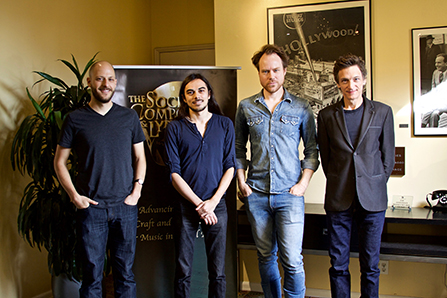
Q: What was the most inspiring moment while working on the film?
John Hawkes: I think the very first scene that we shot was inspiring. The very first scene that we shot is the one that is placed second in the film. It is the scene where I had to play a guitar at the end. That scene begins in a nightclub. All in one take it moves to a dressing room where there is a small fight I'm involved with that follows my character out onto a Los Angeles street. We walk down the block and go into a club where Sally J and her band are playing. At the very end of that, it is the end of the night and people have left and she asks me to sing a song. It is just such an ambitious shot and it was the very first scene that we attempted in the movie, and it was really liberating and gratifying to be part of this long take that worked. I have to say, I think we did ten or eleven takes of that, and I do not think I ever made a mistake with the song, which was really great. At the end of an eighteen minute take, to be fair, it is eighteen minutes, you do not want to be the person who screws up a perfect take and everything has to start over and takes about an hour to reset everything between the two clubs, etc. The very first scene I think was so inspiring for myself, and I think all of us felt like we can do this.
Q: "Too Late" was shot in 35 mm. What do you think about this format and why is it important? Particularly for this film.
John Hawkes: I think Dennis wanted a certain look for this film. I guess he felt only 35 mm film would satisfy. It does make shooting an eighteen minute take more difficult, and also ensures that there is less chance of digital trickery. There are no edits in this movie really, no internal edits, til the very end of the movie, the last few minutes. Dennis did not really change anything in the picture itself. Again, there are no sleek edits or anything. As tempting as that would have been because there are scenes where if they could have been shot together they'd have been a perfect scene but that wasn't his approach. I personally like 35 mm film because oddly even though it's grainier than digital it somehow looks more real to me as I watch it. I feel more a part of the story, maybe that's just because I grew up watching films.

Q: What are you current and/or upcoming projects?
John Hawkes: Sure. I've got a couple of films completed. One's called "Life of Crime", play the lead in that with Anthony Anderson and Octavia Spencer, and some others. There's a movie called "Unlovable", very low budget independent feature I just worked on. "Unlovable" was really wonderful because I played an agoraphobic grunge write several pieces of songs and several whole songs for the movie. Some of the words were written by the screen writer but many of them I came up with myself. I think are a total of twelve or thirteen musical cues that I needed to come up with. That was really an enjoyable challenge. That just finished about a week and a half ago. "Unlovable". Finally, for Amazon TV, I just did a pilot called the "The Legend of Master Legend" where I play the character of Master Legend, a real life superhero living in Florida. Waiting to see if that gets picked up. On the music side I play in a band called Rodney and John. We are finishing up a record and plan to release it and tour it in 2017. We'll be making a video of our version of the band of the song Down With Mary and that will I believe be available online December 12.
Q: Okay. I have a question. The Amazon show, is it a Marvel or a DC comic, or is it indie comic?
John Hawkes: Master Legend, as he's known, is a real life superhero. This is a phenomenon that exists. There's been a documentary made about it. Real life superheros are people who possess no magical power, generally make their own costumes and patrol the streets at night fighting crime.

Q: That sounds awesome.
John Hawkes: Mm-hmm (affirmative)
Q: What kind of advice could you give to someone who would like to work as an actor or as a singer/songwriter?
John Hawkes: Well, I say that any person who doesn't want a normal job is working in the circus. I call it a circus because you're in the entertainment field. People who have jobs outside the norm, and believe me I've had a lot of normal jobs, have joined the circus. I guess the first question I would ask anyone who wants to be part of the circus or maybe more understandably, simply, if someone who wants a creative job, a life that involves a career in the arts I guess. The first question that I would have them ask themselves is do you really want to do it, and ask yourself why you want to do it. If it's to be rich and famous, you might not be happy. You might be, but if it's because you love being part of art and storytelling that's a good answer. I think that if there's anything else in the world that you think you might want to do, you should pursue that. If this is in your blood and it's all you want to do, you should be happy you found something you love and work at it as hard as you can. I would recommend life experience over schooling but that's just been my experience. Schools offer a lot, I'm sure, for musicians, actors, artists. Life experience is key, I believe, and is irreplaceable. Try to live a little outside of the art, doing other things. You need to find what's unique about you. Your voice, not just as a singer, your voice as a novelist or sculptor or whatever you're pursuing. What makes you unique and what makes you different and to really accept that, find it first and then accept it for what it is. Then realize that's what makes you interesting and unique and don't be afraid to do then do things that aren't necessarily in the books, so to speak. To break rules. I think when you find your own voice you can do that. Finally I would say that if you want a life in arts, and I think this goes for all humans in all their work and their lives, it's the people who succeed aren't the ones who never get knocked down because everyone gets knocked down. It's the people who stand up and brush themselves off and take another step and continue on that generally do the best.
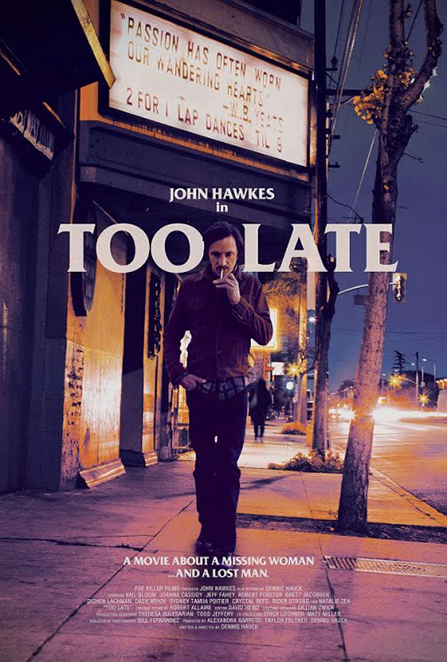
We sincerely thank John Hawkes for answering our questions
An huge thanks to Ray Costa for helping us to have this great interview..


